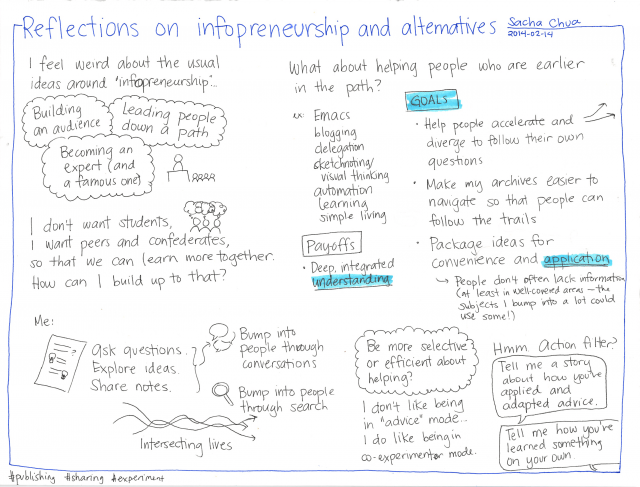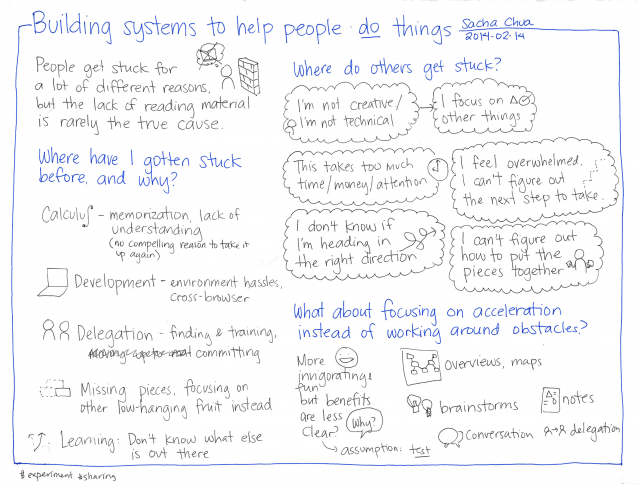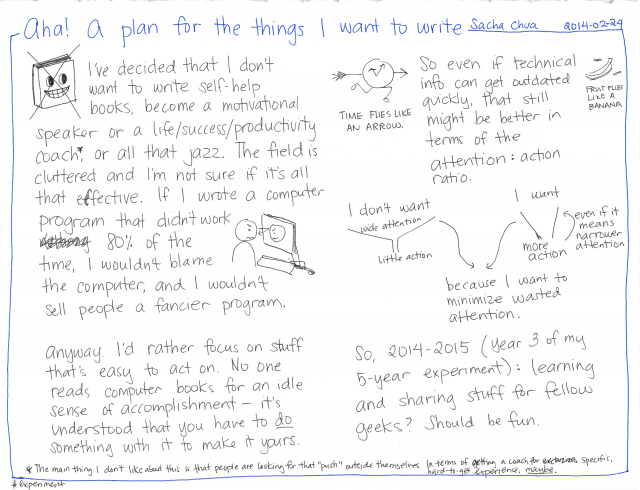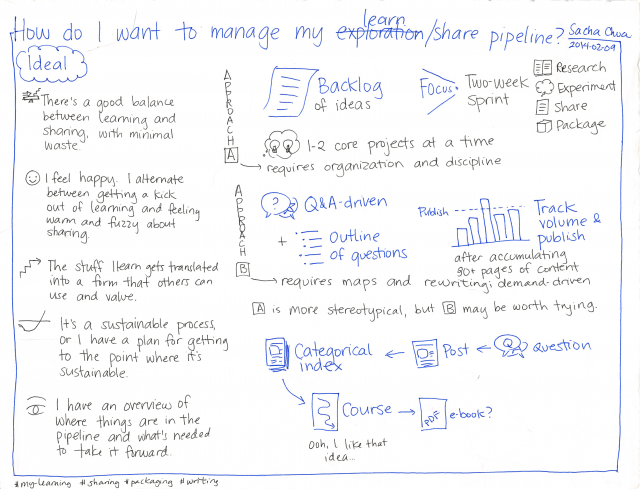Reflections on infopreneurship
Posted: - Modified: | entrepreneurship, experiment, writingThere's a lot of information on how you can build an online business by selling what you know. Many people are looking for that dream. It feels a little weird to me, and I want to figure out why. I guess one of the things that rubs me the wrong way is that a lot of people talk about becoming an expert in some crowded topic, and building an audience somehow. I don't want an audience. I don't want students. I want peers and confederates: people who learn, act, reflect, and share.
Another thing that makes me uncomfortable is that there seems to be very little expectation of action. There's a lot of talk about it. But when I go and follow up with people on the results of the advice I applied from them, they're boggled that I actually did something. One person I talked to said that 80% of the people he talked to don't end up doing anything. 20% is still a good number, but still… Steve Salerno wrote in Sham: How the Self-Help Movement Made America Helpless that the people who buy new self-help books tend to be people who bought a similar self-help book in the past 18 months. I don't want to give people something that just makes them feel like they've made progress instead of helping them actually do things.
I think part of my hesitation comes from this: People get stuck for lots of different reasons, but it's rarely for lack of reading. I don't want to pitch information as the magic pill, the silver bullet, the shortcut to making things happen.
When I read, I skip platitudes but dig into reflections and lessons learned. I like processes and workflows. I want what I share to be similarly useful. The stuff that helps me get unstuck tends to result in thoughts like this:
- “Oh! That's the name of what I'm looking for. Now I can dig into the details.”
- “Hmm, what I'm dealing with turns out to be fairly common. I can try what other people have done.”
- “Oh, I see, I was missing that particular piece. Let me try this now.”
- “Interesting question! Let me explore that…”
- “Okay, that's less intimidating than I thought. I should just go for it.”
- “I had no idea you could do that! Oooh…”
What can I write or draw to help people get those moments? How do I help people get unstuck – or better yet, how can I help them accelerate or expand their learning? And since I can code and tinker and dream… What can I make? Ideas are one thing, but tools are another. I'll keep an eye out for places where people are consistently getting stuck, and I'll see which ones lend themselves to automation.
As I explore packaging and publishing more, I want to focus on stuff that people can't find in a gazillion other blogs and e-books out there. Keep me honest. =) I like making things free/pay-what-you-want, since it helps me act from abundance, widen the conversation, and make room for people's generosity. I'll also share the processes and tools I'm building for myself. If you find them interesting, tell me, and maybe we can find ways to tweak and expand them to accommodate your idiosyncrasies as well as mine. I like the conversations that grow out of this, too.
Some of my technical role models have published books (both self-published and traditional). I can see how that saves a lot of people time and helps people learn. They work on open source projects and commercial systems too. I think that's the sort of information work I want: stuff that helps people do things.
Hmm… Aha! Maybe that's it. If I focus on helping fellow geeks solve problems or try interesting things (mostly tech, some lifestyle?), then I don't have to worry as much about wasting people's attention. We're used to trying things out and testing them against our own experience, and we're used to telling people “Hey, that didn't quite work for me” or “That saved me a few hours of figuring things out! Here's something to make it even better.” =)
(No offense to life coaches, motivational speakers, and self-help authors. Hey, if it works for you, great. =) I don't have the experience to give good, well-tested advice in that area yet.)
Technical guides, I think. My long-postponed book about Emacs. Short guides about Org Mode or automation or Evernote or information management. There's a lot to write. These aren't books people read for inspiration and the vague desire to do something someday; they address what people want to improve now. (Well, maybe Emacs is a little on the inspirational side. ;) )
It's easy for me to connect with people who are already travelling similar paths. I can share my notes. I can reach out and ask questions. What about helping people who are just starting down those paths? Maybe that's where packaging what I know can be useful, especially if I can help people accelerate their learning and diverge to follow their own questions. My selfish desire is to learn from other people's perspectives. I don't want to make people dependent on me, the way that people seem to become fans of one motivational speaker or another. I want people to learn from what I've learned, but I also want them to translate it to their contexts, test it against their lives, and add their own insights. I'm happy to spend extra time helping beginners who do stuff, think about it, and then go on to ask different questions.
So, what would the processes look like if I figured this out? I'd have a good balance of thinking, learning, doing, and sharing. I'd be able to work top-down from outlines, anticipating the questions people might have. I could work bottom-up from questions and blog posts, too. I might not notice that I have enough to publish, so I could establish triggers to check whether enough has accumulated that it needs to be chunked at a higher level of abstraction: Q&A or sketches into blog posts, blog posts into series, series into short books, short books into longer ones. I'd harvest all the generally useful Q&A from e-mail and conversations to make sure they're captured in the pipeline somewhere, even if it's an item in my Someday list.
Onward!




